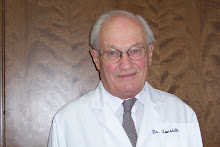My Background
The details of my medical background are pretty straightforward:
-Medical Degree from University of London, England
-Pediatric Residency at the Cleveland Clinic Foundation, Cleveland, OH
-20 year career at the Cleveland Clinic Foundation including, on staff in the Department of Pediatrics, sub-specialty in Pediatric Oncology, and lastly Head of Biochemical Genetics within the Department of Pediatrics
That's what I look like on paper. But if you lift the lid on my background you will find that happenstance collided with curiosity which led me to the mysterious field of inborn errors of metabolism.
There is one case in particular that sticks out in my mind as the case which led me down this path and forever transformed how I looked at modern medicine and the role of vitamins and food in the body. This case was, for me, the point of no return.
I was confronted with a 6-year old boy who had suffered a series of repeated, self limiting episodes of ataxia, a brain condition causing gross lack of coordination, loss of balance and slurred speech. When in one of these attacks he would appear to be drunk. Each attack would gradually become worse over the first 4 or 5 days and then slowly get better over the next few days. Each time this happened he would lose some degree of mental ability. All the previous tests and studies had been of no help. I was aware that at least one inborn error of metabolism had been reported and the diagnosis had been made by a special test of urine. We had to wait over a year before he had another of these strange attacks and he was admitted to hospital and we were able to run the urine test. The test revealed that he had an abnormality in his ability to process glucose to make cellular energy and that this was affecting brain function. This is exactly what happens in the ancient disease known as beriberi, a nutritional disease known for thousands of years in Eastern cultures that depend on white rice (rice that has been milled to remove the cusps from the grain) for their staple diet. Brown rice is full of thiamine or vitamin B1. In the process of creating white rice, they remove the part that contains the B1. The boy turned out to be dependent on huge doses of vitamin B1!
As long as he stayed on B1 in supplement form he did not have any further attacks. The usual need for this vitamin from diet is about 1.5 milligrams and he required 600 milligrams a day! In fact, if he felt the onset of a cold or minor infection we'd have to double the dose! This phenomenon is called vitamin dependency rather than dietary deficiency.
This was the first case to be reported in the medical literature since it was a new major discovery. The curious thing is it caused virtually no stir at all, even among my colleagues and I began to ask myself why not...
This was my most dramatic professional experience and it set me thinking. How many curious diseases were occurring because of a breakdown in the use of oxygen in creating energy for function of all our cells and paricularly the brain and nervous system (which require huge amounts of oxygen). I asked myself, what do we do with oxygen and why is thiamine so important? With this question at the root, I set out on a research journey that began with that case and continues to this day.
I learned everything there was to be known about thiamine and how it relates to other vitamins. I found that some poorly understood diseases in children respond to simple vitamin therapy. Because of this search, which covers to date a period of about 40 years, I very rarely use pharmaceutical drugs.
Louis Pasteur, who discovered that microorganisms cause disease, said on his death bed "I was wrong. It is the defenses that count!"
Subscribe to:
Post Comments (Atom)

No comments:
Post a Comment